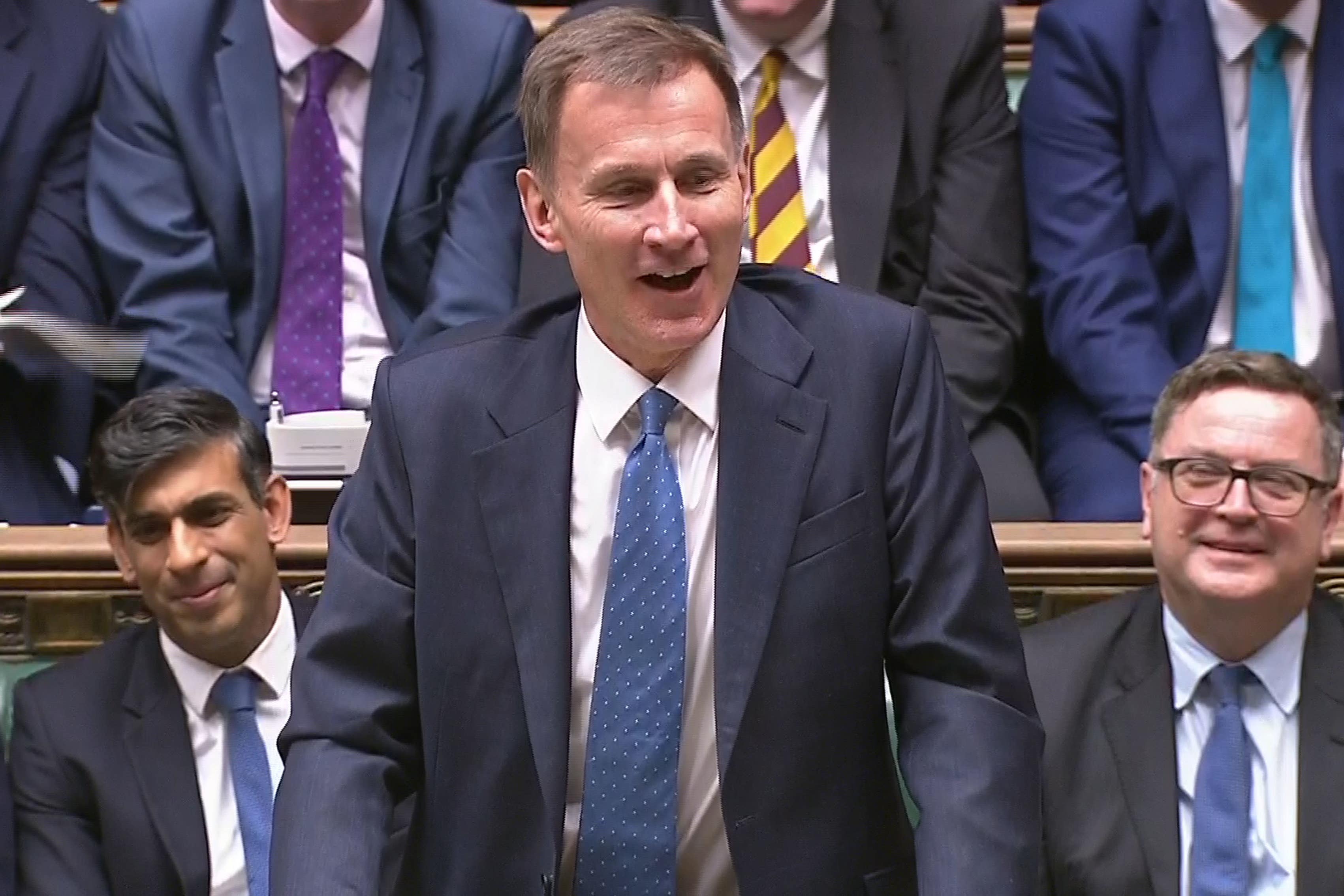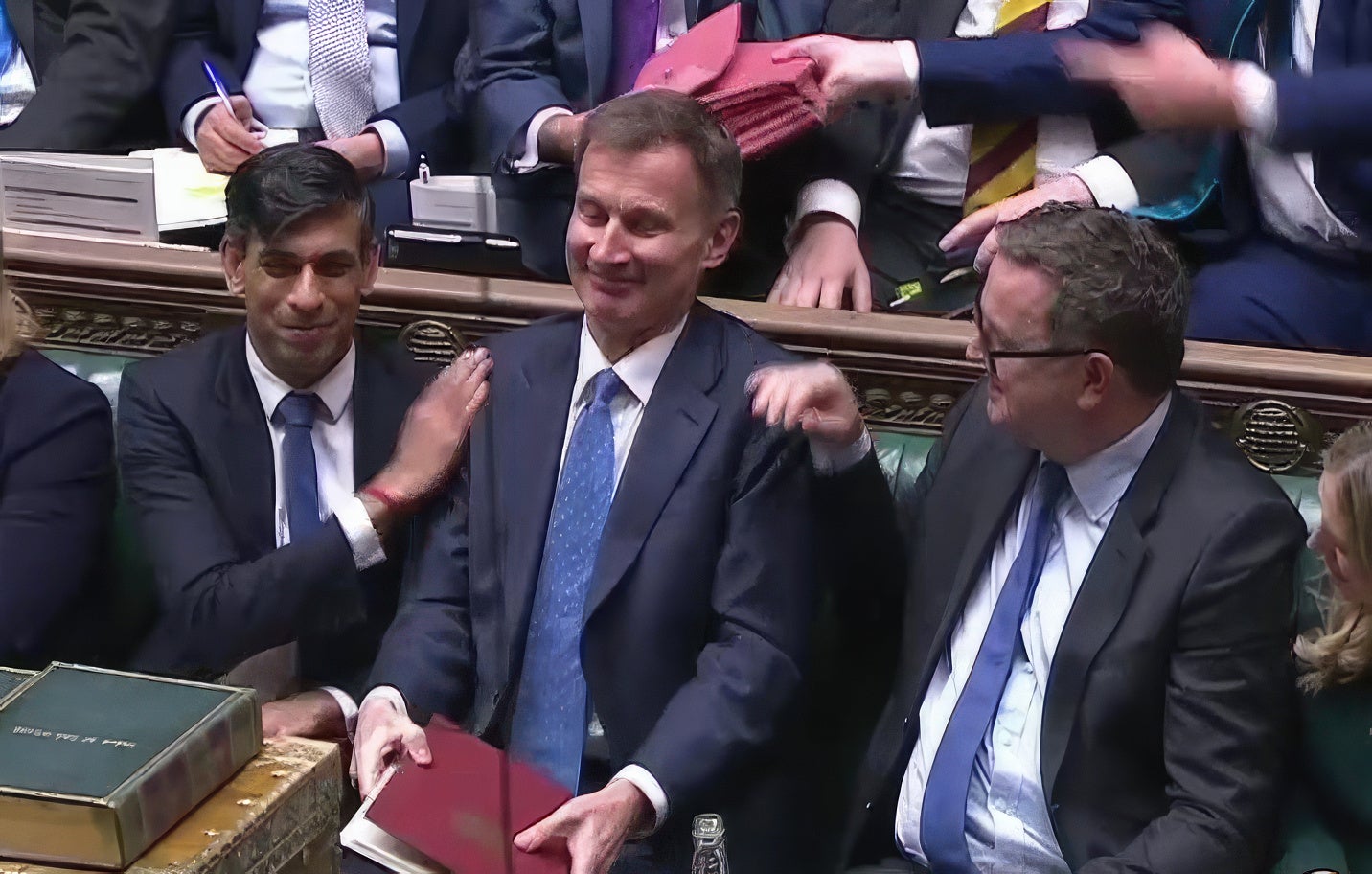What does Jeremy Hunt’s autumn statement mean for your benefits?
Jeremy Hunt was loudly heckled in Parliament as he announced a fresh benefits crackdown for people who refuse to find work
Your support helps us to tell the story
From reproductive rights to climate change to Big Tech, The Independent is on the ground when the story is developing. Whether it's investigating the financials of Elon Musk's pro-Trump PAC or producing our latest documentary, 'The A Word', which shines a light on the American women fighting for reproductive rights, we know how important it is to parse out the facts from the messaging.
At such a critical moment in US history, we need reporters on the ground. Your donation allows us to keep sending journalists to speak to both sides of the story.
The Independent is trusted by Americans across the entire political spectrum. And unlike many other quality news outlets, we choose not to lock Americans out of our reporting and analysis with paywalls. We believe quality journalism should be available to everyone, paid for by those who can afford it.
Your support makes all the difference.Chancellor Jeremy Hunt has announced a boost to benefits and a huge increase to the state pension but detailed a fresh crackdown on some welfare claimants in his autumn statement.
Mr Hunt said he would increase universal credit by 6.7 per cent, in line with September’s inflation figures, after reports he would uplift benefits by October’s far lower figure of 4.6 per cent, meaning a cut for lower-income households.
He said the uplift would be an “average increase of £470 for 5.5 million households next year”.
The chancellor gave a considerable boost to pensioners, ensuring that the so-called triple lock remains in place. The state pension was boosted by 8.5 per cent, “one of the largest-ever cash increases of the state pension”, Mr Hunt declared.
However, he was loudly heckled in the House of Commons as he announced a fresh crackdown on benefit claimants who do not find work within 18 months.

The Independent has summarised the chancellor’s announcements below:
Benefits
Typically ministers use the September figure for inflation when uprating working-age benefits, which would mean a 6.7 per cent hike.
And there were various reports that Mr Hunt would be using October’s far lower figure of 4.6 per cent, which economists say would cut spending by around £3 billion.
To put this cut in practical terms, the Joseph Rowntree Foundation (JRF) said that a couple with two children will lose £262 a year under this new arrangement.
However, Mr Hunt raised benefits in line with the 6.7 per cent figure in recognition of the fact that “cost of living pressures remain at their most acute”.
Before Mr Hunt’s announcement, the government had already trailed that free prescriptions and legal aid would be cut off for claimants who are deemed fit to work and do not seek employment.
Mr Hunt said today there would be a further £1.3 billion of funding to help 300,000 people who have been unemployed for over a year – but warned that if people did not try to find work their benefits would be cut.
He said: “If after 18 months of intensive support jobseekers have not found a job, we will roll out a programme requiring them to take part in a mandatory work placement to increase their skills and improve their employability. And if they choose not to engage with the work search process for six months, we will close their case and stop their benefits.

Housing
In a positive move for renters, Mr Hunt said he was raising the Local Housing Allowance (LHA) rate, which determines how much people on benefits can claim towards their rental costs.
He said: “I will therefore increase the local housing allowance rate to the 30th percentile of local market rents. This will give 1.6 million households an average of £800 of support next year.”
Rick Henderson, CEO of Homeless Link, the membership body for homelessness services in England, welcomed the move.
He said: “It’s no secret that homelessness and rough sleeping are spiralling while local authorities and charity services are buckling under the pressure. Raising LHA will at least mean people on low incomes have more breathing space, allowing them to access more affordable housing options while helping prevent homelessness caused by rent arrears.
“However, we are alarmed by the government’s plans to increase the use of punitive welfare measures. Research shows benefit sanctions are disproportionately applied to people experiencing homelessness and are not effective in helping them into work.”
Generation Rent, a group that represents private renters said: “Much needed relief for 1.6m private renter households from chancellor who has raised Local Housing Allowance in line with the cheapest 30 per cent of rents.
“But this needs to be an annual increase to keep up with rising rents, rather than leave them frozen as they have been since 2020.”

Pensions
Mr Hunt has said he will honour the pensions triple lock and raise the state pension by 8.5 per cent next April.
The triple lock is a landmark policy introduced by the Tory government that means the state pension will increase every year by the highest of inflation, average earnings growth or 2.5 per cent.
There was speculation Mr Hunt was going to say that bonuses handed out to NHS and civil servant workers had skewed the figures, so he was tweaking the uplift to 7.8 per cent.
However, possibly sensing a general election on the horizon expected next year, he has stuck to the original pledges of the triple lock and ensured pensioners get what they were expecting.
Any reduction from Mr Hunt would have led to accusations the government was embarking on a “raid” of pensioners incomes during a cost of living crisis.

Join our commenting forum
Join thought-provoking conversations, follow other Independent readers and see their replies
Comments